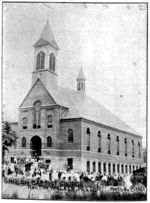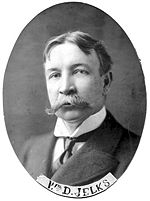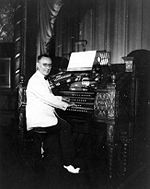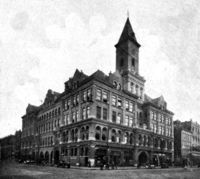1901
1901 was the 30th year after the founding of the city of Birmingham.
Events
- February 23: A rare snowfall brought 5 inches to Birmingham.
- March 25: A series of tornadoes swept through the Birmingham area, killing 16 and destroying or damaging 531 buildings.
- April 17: The Birmingham Railway, Light & Power Company streetcar barn and 3rd Presbyterian Church were destroyed in a fire.
- May 30: Telegraph operator James Cook shot physician John Payne in the head, apparently motivated by jealousy.
- September 10: Birmingham became the first city in the South to be rated "Class 1" by the National Board of Fire Underwriters.
- October 16: Buffalo Bill's Wild West paraded through downtown Birmingham and put on shows at Smith's Park.
- October 28: Ullman School opened.
- November 28: Alabama adopted the Alabama Constitution of 1901
- The town of Adamsville was incorporated (for the first time).
- The town of Brighton was incorporated.
- Birmingham Public Library opened to subscribers.
- The Birmingham Boys Club was founded.
- The Carnival Society held their last Mardi Gras ball in Birmingham.
- The Elite Opera Company began performing at Lakeview Park.
- Frank Holt purchased the property on which the community of Holt grew in Tuscaloosa County.
- A post office was returned to the community of Jefferson, which took the name Kimberly.
- The town of Thorsby was incorporated in Chilton County.
- The community of Westover was established.
- Property on the 600 block of 20th Street South was acquired for a new Hillman Hospital building.
- The Brookside Catholic Cemetery was established by SS. Cyril & Methodius Catholic Church.
Business
- May 29: Andrew Beard was granted U. S. Patent No. 675,346 for an improved automatic car-coupling.
- June 13: Birmingham Railway, Light & Power Company officially acquired Consolidated Electric Light Company and the Birmingham Gas Company.
- The Alabama Grocery Company was founded with Sid Lee as president.
- Berney National Bank was absorbed by the First National Bank of Birmingham.
- Buffalo Rock Ginger Ale was created by Sid Lee and chemist Ashby Coleman.
- Dewberry Engraving was founded by J. Ralph Dewberry.
- Development of Glen Iris began.
- William Graves founded the Graves Shale Brick Company.
- Carrie Hill and Mrs J. B. Raulston established an art studio on the top floor of the Commercial Club Building.
- The main office of the J. C. Mayfield Manufacturing Company moved from Birmingham to Nashville.
- U. S. Steel was incorporated by J. P. Morgan.
- John Lansden's first prototype for the Lansden electric wagon was put into service of the Hillman Hotel as a guest shuttle to Union Station.
- T. A. Klebs sold his drug store and relocated to New York City.
Education
- Ensley High School was founded, meeting at the Old Bush School.
- Graymont Elementary School and Lakeview School opened.
- William Wyman succeeded James Powers as President of the University of Alabama.
Government
- February 27: The Alabama Department of Archives and History was created by state law.
- March 2: The trustees of the Alabama Department of Archives and History had their first meeting, making Tom Owen director.
- March 2: The Alabama State Legislature passed a local prohibition law forbidding alcohol sales within a two mile radius of Owenton College.
- April 19: The Jefferson County Sanitary Commission held its first meeting.
- June 11: William D. Jelks succeeded William J. Samford as Governor of Alabama
- William Brandon became the reading clerk for the 1901 Constitutional Convention.
- Incumbent Mel Drennen defeated businessman Ross Smith in the Birmingham mayoral election.
- Father Thomas Kennedy was appointed pastor of the newly finished St Anthony's Church in Ensley.
- William Wier succeeded C. W. Austin as Birmingham Police Chief
Religion

- February 10: Ensley Highlands Presbyterian Church was organized.
- Francis Brandon succeeded William Blevins as pastor of Trinity Methodist Church (Southside).
- A. J. Dickinson succeeded B. D. Gray as pastor of First Baptist Church of Birmingham.
- E. B. Norton succeeded Eugene Hawkins as pastor of East Lake Methodist Church.
- The Owenton Church was founded.
- Shiloh Baptist Church completed its new, massive sanctuary.
- The Church of Christ group sharing Union Baptist Church moved out.
Sports
- November 15: The Alabama Polytechnic Institute defeated the University of Alabama 17-0 at Tuscaloosa in a still-budding cross-state rivalry.
- The Southern Association was organized at the Morris Hotel.
- The Birmingham Barons joined the newly-formed Southern Association.
Individuals
- December 5: Thomas Martin was admitted to the Alabama State Bar.
- December 15: Paul Cole joined the Birmingham Police Department.
- Robert Baugh succeeded Henry Milner as president of the Country Club of Birmingham.
- James Bowron resigned from the Tennessee Coal, Iron and Railroad Company.
- William Elias B. Davis served as president of the American Association of Obstetricians and Gynecologists.
- A. O. Lane succeeded Samuel Ullman as president of the Birmingham Board of Education.
- Willis Milner resigned from his posts at the Elyton Land Company.
- Architect Joseph Turner moved his family to Birmingham.
- Architect William Weston moved to Birmingham.
Births
- January 5: Luke Sewell, baseball player
- March 9: Nelson Brackin, retailer
- June 24: Richebourg McWilliams, Birmingham-Southern College writing professor
- June 29: Luther Coggin, auto dealer
- September 5: Stanleigh Malotte, theater organist
- December 20: Robert Van de Graaff, physicist and inventor
- Harold Blach, retailer
- William Christian, accountant
- Mary Fabian, opera soprano
Marriages
- May 31: Miller Reese Hutchison married Martha Jackson Pomeroy in New York.
- November 6: John Coe to Margaret Ware Smith.
- December 18: David McLendon married Neva Lillian Davis.
- Morris Newfield to the former Leah Ullman.
Retirements
- Louise Wooster, madam
Deaths
- January 15: Sylvester Daly, iron-worker, saloonkeeper and member of the Birmingham Board of Aldermen
- January 31: Thomas Dill, former Howard College professor and dean
- March 28: William Jemison, Tuscaloosa Times owner and former Mayor of Tuscaloosa
- July 11: John Webb, Birmingham Board of Aldermen, City Marshal, and owner of Webb Saloon
- November 29: Arthur McGaha, former president of Howard College
Works
- The Harry Jones (fire engine) was acquired by the Birmingham Fire Department.
Buildings
- Avondale Elementary School addition
- East Lake School
- Birmingham City Hall (1901)
- Ensley Highlands Presbyterian Church
- Ensley School
- Graymont Elementary School
- Hillman Hotel
- Lakeview School
- McElwain Baptist Church (former building)
- Shiloh Baptist Church (former building)
- Southern Club
- 2nd Presbyterian Church (now UAB's Spencer Honors House)
- St Anthony's Church, Ensley (former building)
- Ullman School
- Westover House
- Haskins Williams residence
Context
1901 was the first year of the 20th century. Queen Victoria died and the Commonwealth of Australia was founded. Oil was discovered near Beaumont, Texas. Scrooge, or, Marley's Ghost was released, the first film to feature intertitles. William McKinley began his second term as President in January and was assassinated in September. Vice President Theodore Roosevelt took office. He caused a backlash by inviting Booker T. Washington to the White House. The first Nobel Prize was awarded. The first trans-Atlantic radio signal was received. Picasso entered his "blue period".
Novels published in 1901 included Anna Lombard by Victoria Cross, Kim by Rudyard Kipling, Buddenbrooks by Thomas Mann, The Tale of Peter Rabbit by Beatrix Potter, and The First Men in the Moon by H. G. Wells. Non-fiction included The Psychopathology of Everyday Life by Sigmund Freud and Up from Slavery, an autobiography by Booker T. Washington.
Popular music published in 1901 included "High Society" by Porter Steele, "I Love You Truly" by Carrie Jacobs-Bond, "Mighty Lak' A Rose" by Frank Lebby Stanton & Ethelbert Nevin, and Symphony No. 4 by Gustav Mahler.
Notable births in 1901 included cartoonist Chic Young, actor Clark Gable, comedian Zeppo Marx, actor Gary Cooper, musician Louis Armstrong, television host Ed Sullivan, and businessman Walt Disney. Notable deaths included Queen Victoria of the United Kingdom, composer Giuseppe Verdi, former president Benjamin Harrison, painter Henri de Toulouse-Lautrec, and President William McKinley.
| 1900s |
| << 1900 1901 1902 1903 1904 1905 1906 1907 1908 1909 >> |
| Births - Deaths - Establishments - Events - Works |


